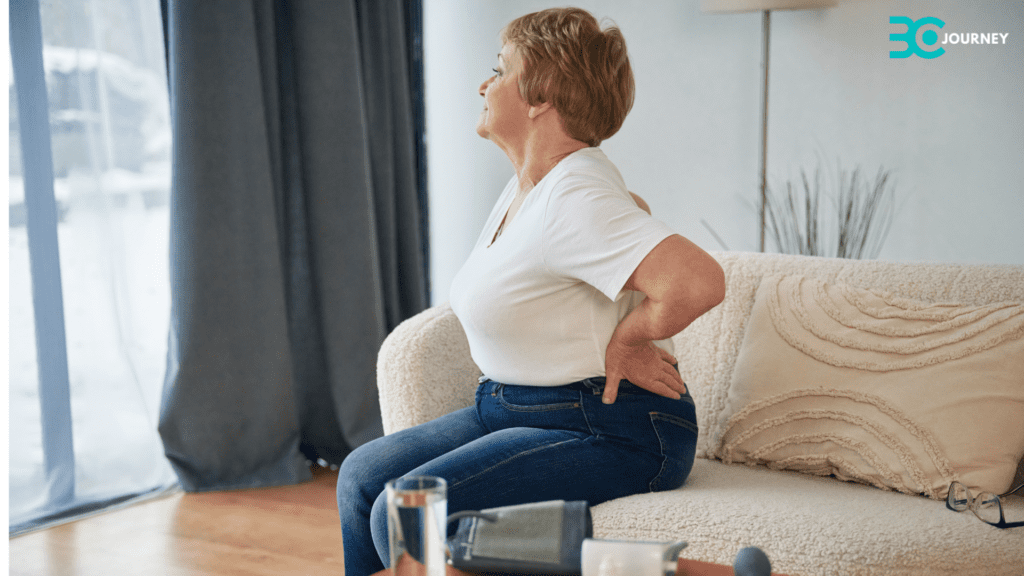Purpose of the Article:
To discuss the complex relationship between weight gain cause back pain. How does weight affect the spine, muscles, and joints? By understanding that, we can realize the importance of maintaining a healthy size.
Understanding Back Pain
Types of Back Pain:
Back pain can come in many forms, affecting different back parts and differing intensity levels. There are three main categories of back pain:
Upper Back Pain: Though fewer joints exist, upper back pain can result from poor posture and weight-related strain on the shoulders and neck.
Low Back Pain: This is often suffered by overweight people; conditions like sciatica lead to low back pain as a rule among such people.
Middle Back Pain: Although less frequently seen, middle back pain can result from incorrect posture and weight-bearing strain on the shoulders and neck.
Acute vs. Chronic Pain: Chronic pain remains over time, whereas acute pain occurs suddenly and usually as one single event. For example, the types of “lower back pain overweight” and “back of fat person” problems that often occur in those with a higher body weight show clearly how powerfully weight can act on various parts of the back.
For individuals with higher body weight, issues such as “lower back pain overweight” and “fat person back” are frequent concerns, highlighting the significant impact of weight on different back areas.
Causes of Back Pain Due to over weight:

There are many reasons people have back pain, including a big one is weight. By understanding these causes, it can help in the relief and relieving of back pains:
Can a Big Stomach Cause Back Pain?
Yes, putting too much weight on the stomach can cause back pain. It changes the body’s center of gravity and pressures the lumbar area (supported by hip and root bracing muscles) much more than it should have.
Does Gaining Weight Cause Back Pain?
The weight that goes on the body adds load to the spine. This added pressure makes its presence felt in vertebral bodies, discs, and surrounding muscles. Excessive stress can produce pain, particularly in the lower back, where you most often feel it.
The Link Between Weight Gain and Back Pain
The biomechanics of the spine are inextricably linked to body weight. Extra weight, especially around the stomach area, will push the body’s centre of gravity forward. The spine must adapt to this balance shift by bending more to retain our vertical stance. In turn, its curves get exaggerated (lordosis), and compressed lower back muscles bear any manipulation from the rest of the column. This abnormal curve places undue pressure on the vertebra and other spinal joints and usually leads to pain.
Increased Pressure on Joints:
Each extra pound adds additional pressure to the joints and discs in your spine. This increased pressure quickens wear and tear, a prime cause of degenerative diseases like osteoarthritis. As time passes, this can be “the roots of future lower back problems,” which are more virulent and challenging to deal with.
Muscle Strain:
The extra weight puts much strain on the muscles holding up the spine, not just the spinal muscles but also those supporting them. In particular, the muscles along the lower back are most likely strained because they have to work harder now that they’re carrying an additional burden. This muscle strain often leads to tension and pain, especially for anyone experiencing “lower back pain and weight gain.”
Link Between Weight Loss and Back Pain
Back and Hip Pain After Weight Loss:
Some people, unfortunately, experience back and hip pain after losing a significant amount of weight. This phenomenon, referred to as “Hip and back pain after weight loss,” is caused by the body’s adaptation to a new equilibrium. The muscles and joints under different pressures before may respond differently now: a change in distribution sometimes brings discomfort.
Sciatica and Weight Loss:
A condition characterized by compression or irritation of the sciatic nerve, resulting in pain that radiates down your leg. If you lose weight, the pressure on your spine and nerves can be eliminated. This will relieve symptoms of sciatica.
Prevention and Management
Weight Management Strategies:
Preventing back pain Maintenance of a healthy weight is critical. Strategies for effective weight control:
Balanced Diet: Foods rich in nutrients but low in processed foods help maintain a healthy weight.
Regular Exercise: Cardiovascular exercises and strength training will both aid in weight management AND decrease the chances of back pain.
Lifestyle Modifications: Good practices necessitate less dependency on a chair and more physical activity, which overall is ideal for health and avoids back problems in the future.
Exercise for a Stronger Back:
Back muscle strength plays a vital role in preventing back pain. Such exercises as planks, bridges, and back extensions all work the muscles of the lower back and trunk, providing better support for the spine.
Posture and Ergonomics:
Correct posture and specially designed furniture are essential for avoiding back pain for the heavy-bellied or pot-bellied individual. Ensuring the spine is in proper alignment, whether sitting or standing, relieves the overall strain on the back. Ergonomic furniture and thoughtful adjustments to posture can significantly improve back health.
If Weight Gain cause Back pain Than When to See a Doctor

Warning Signs:
While back pain is joint, specific symptoms require professional medical advice. These include:
Severe or persistent pain that does not ease after resting.
- Pain going down the legs, which might indicate nerve involvement.
- Numbness and weakness in the limbs.
- Difficulty controlling bowel or bladder function.
These symptoms, in particular, should be of concern to people who are overweight or have been experiencing significant weight changes recently.
Medical Treatments:
For back pain associated with weight gain or loss, several medical interventions may be necessary. These can range from physical therapy and chiropractic care at one extreme to medications and, in severe cases, surgical options. Early intervention can prevent more serious problems from occurring and can also help make life easier.
Conclusion
Weight gain and loss have a pronounced effect on back health. Excess weight, especially in the belly, can lead to back pain because of increased strain on the spine and muscles. On the other hand, weight loss, while generally beneficial, can also bring about temporary discomfort as the body adjusts to its new distribution of forces. Understanding these links is crucial to effective back pain prevention and management.
Taking proactive steps to control weight and maintain back health is essential. Adopting a balanced diet, regular exercise and good posture can significantly reduce the risk of back pain and enjoy a healthier, more active life.
FAQs
Common Questions:
Does gaining weight cause back pain?
Back pain is a common health issue worldwide and can strike people of all ages. From minor irritation up to severe, crippling pain that interferes with daily life activities continues despite the best conventional medicine. Back pain can stem from many sources, such as poor posture, muscle strain, injury to the spine, and underlying medical conditions. One issue that has been fiercely debated is whether or not adding to your body weight will make back pain better or worse.
How to relieve lower back pain from being overweight?
Gaining too much body weight means your joints, muscles, and spine must bear the added burden. The lower part of the back, which must also support most of the body’s weight, is particularly vulnerable to this. Therefore, it is little surprise overweight and obese people are more likely than those at a healthy weight to suffer from constant lower back pain.
Offering readers a precise appreciation of the link between weight and back pain, this broad view of the problem provides people at the tipping point for losing control with valuable insights and complex data to manage their lives. This comprehensive approach gives readers a rich understanding of how weight affects back pain, balanced with practical medical and health advice.

